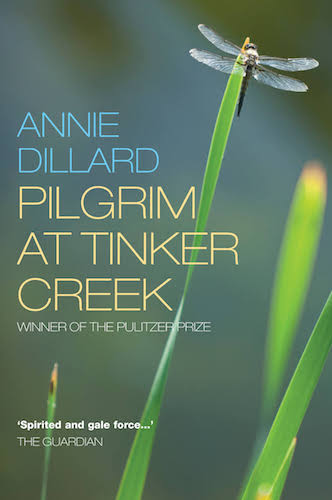
I put off reading the Pulitzer-Prize-winning Pilgrim at Tinker Creek for longer than I should. I’d gathered it was a rather spiritual book, and I seldom enjoy such writing. But my misapprehensions were misplaced: Pilgrim at Tinker Creek is an absolute delight.
Annie Dillard muses about our relationship with the natural world, and how the natural world came about. Yes, there is plenty of spiritual stuff in there that I don’t agree with, but it is written in such a way that you’re never entirely sure where Dillard herself stands on the subject—if, indeed, she has come to any conclusion. Pilgrim at Tinker Creek is very much a thinking-aloud book: Dillard is writing this stuff to try to get her head around it. Which is one of the best reasons anyone can have for writing anything.
Dillard is also extremely good at writing succinctly from what I would describe as a more scientific viewpoint. A handful of gems that stood out:
- [Re. the old chestnut about a tree falling in the forest] …beauty and grace are performed whether or not we will sense them. The least we can try to do is be there.
- More than one insect […] is an assault on all human value, all hope of a reasonable god.
- Nature is, above all, profligate. Don’t believe them when they tell you how economical and thrifty nature is, whose leaves return to the soil. Wouldn’t it be cheaper to leave them on the tree in the first place? This deciduous business alone is a radical scheme, the brainchild of a deranged manic-depressive with limitless capital. Extravagance! Nature will try anything once. This is what the sign of the insects says. No form is too gruesome, no behavior too grotesque. If you’re dealing with organic compounds, then let them combine. If it works, if it quickens, set it clacking in the grass; there’s always room for one more; you ain’t so handsome yourself. This is a spendthrift economy; though nothing is lost, all is spent.
- That insects have adapted is obvious. Their failures to adapt, however, are dazzling. It is hard to believe that nature is partial to such dim-wittedness.
- That there are so many details seems to be the most important and visible fact about creation. If you can’t see the forest for the trees, then look at the trees; when you’ve looked at enough trees, you’ve seen a forest, you’ve got it.
- Evolution, of course, is the vehicle of intricacy. The stability of simple forms is the sturdy base from which more complex stable forms might arise, forming in turn more complex forms, and so on.
- Evolution loves death more than it loves you or me.
- We have not yet encountered and god who is as merciful as a man who flicks a beetle over on its feet.
At one point in the book, Dillard recounts sitting outside a remote petrol station sipping coffee while patting a puppy. She describes the sudden sensation of being in the present. This section resonated immensely with me: it’s a wonderful sensation I’ve experienced many times myself, totally out of the blue. I even have an unpublished article about the phenomenon, which has been sitting in my drafts folder for a couple of years while I wondered what on earth to do with it. I was worried nobody would have a clue what the hell I was one about. But Annie Dillard, for one, clearly would, so perhaps there might be others. Maybe I should get the damn article out there once and for all.
A brilliant book. Highly recommended.
- Buy this book from Bookshop.org (UK) and help tax-paying, independent bookshops.
- Buy this book from Amazon.co.uk
- Buy this book from Amazon.com
Leave a Reply